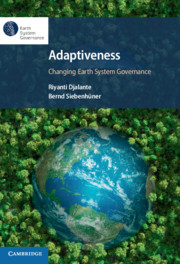Book contents
- Adaptiveness
- Adaptiveness
- Copyright page
- Contents
- Figures
- Tables
- Contributors
- Foreword
- Preface and Acknowledgements
- 1 On Adaptiveness
- 2 Synthesising and Identifying Emerging Issues in Adaptiveness Research within the Earth System Governance Framework (1998–2018)
- 3 Climate Change Adaptive Capacity Assessments
- 4 Assessing the Adaptive Capacity of Collaborative Governance Institutions
- 5 The Marine Debris Nexus
- 6 Synergies and Trade-Offs between Climate Change Adaptation and Mitigation across Multiple Scales of Governance
- 7 Lock-Ins in Climate Adaptation Governance
- 8 Governance and Climate Change Mitigation and Adaptation in Conflict-Affected Countries of Central Africa
- 9 Policy Tools and Capacities for Adaptiveness in US Public Land Management
- 10 Adaptiveness in Earth System Governance
- Index
- References
2 - Synthesising and Identifying Emerging Issues in Adaptiveness Research within the Earth System Governance Framework (1998–2018)
Published online by Cambridge University Press: 22 June 2021
- Adaptiveness
- Adaptiveness
- Copyright page
- Contents
- Figures
- Tables
- Contributors
- Foreword
- Preface and Acknowledgements
- 1 On Adaptiveness
- 2 Synthesising and Identifying Emerging Issues in Adaptiveness Research within the Earth System Governance Framework (1998–2018)
- 3 Climate Change Adaptive Capacity Assessments
- 4 Assessing the Adaptive Capacity of Collaborative Governance Institutions
- 5 The Marine Debris Nexus
- 6 Synergies and Trade-Offs between Climate Change Adaptation and Mitigation across Multiple Scales of Governance
- 7 Lock-Ins in Climate Adaptation Governance
- 8 Governance and Climate Change Mitigation and Adaptation in Conflict-Affected Countries of Central Africa
- 9 Policy Tools and Capacities for Adaptiveness in US Public Land Management
- 10 Adaptiveness in Earth System Governance
- Index
- References
Summary
The Earth System Governance (ESG) Project developed a Science and Implementation Plan in 2009. Adaptiveness has been introduced as an umbrella term for vulnerability, resilience, adaptation, robustness, adaptive capacity, and social learning. Adaptiveness refers to changes taken by social groups in response to, or in anticipation of, challenges created through environmental change. This chapter employs a systematic literature review (SLR) method to answer the question of how adaptiveness has been taken in the literature related to earth system governance. It first analyses research progress over time including conducting a keyword analysis. Through analysis of the most-cited papers, the chapter tries to answer the 2009 Science Plan questions: What are the politics of adaptiveness? Which governance processes foster adaptiveness? What attributes of governance systems enhance capacities to adapt? How, when, and why does adaptiveness influence earth system governance? The chapter finds that adaptiveness has not been taken up as a term, but rather as an umbrella concept. The political nature and the conflicts of adaptiveness recognise that responses to massive changes in the ecological systems substantially impact on political relations and power structures on different governance levels. The learning processes in adaptation governance have a particular interest in transformative change.
- Type
- Chapter
- Information
- Adaptiveness: Changing Earth System Governance , pp. 26 - 49Publisher: Cambridge University PressPrint publication year: 2021

